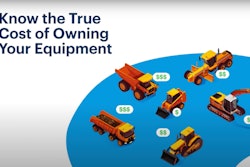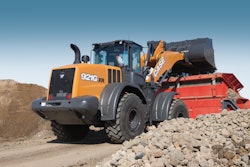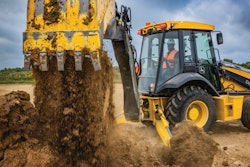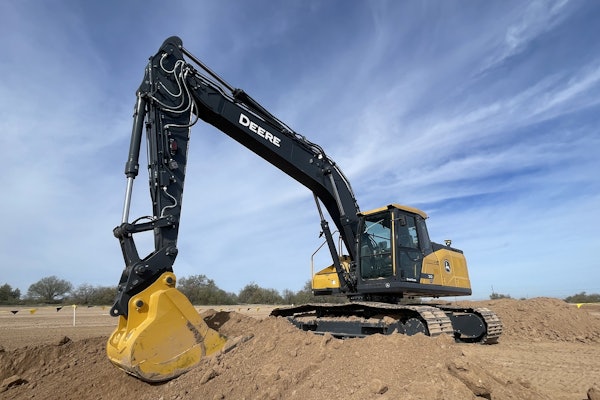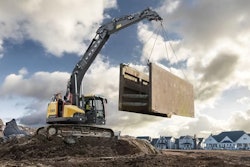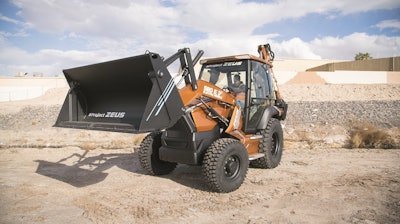
With increasing global demand for zero emissions, CNH Industrial is continuing to build its position in alternative propulsion, including electrification.
The electrification strategy at CNH is envisioned across all product lines for both of its primary off-highway segments: agriculture and construction.
“Our customers are the driving force behind our journey towards the electrification and alternative fuels,” said Seline Tur, CNH Industrial vice president of advanced technologies and innovations. “Sustainability is something our customers, their customers and the planet are demanding. Businesses and their stakeholders would like to reduce their carbon footprint and ultimately meet net zero emissions on a global scale.”
Her comments were made during the recent CNH Industrial Capital Market Day 2022 event.
To meet these needs, she said, CNH’s next-generation products will deliver a better user experience with reduced noise, more responsive and intuitive controls, better traction and increased data availability.
“These benefits open new use cases in specific environments, enabling additional market opportunities beyond current applications,” Tur said. For example, she suggested the use of compact construction equipment indoors and tractors in greenhouses.
“Users are prepared to comply with the emerging regulations which are either being introduced or planned. Regulations are tightening and we are getting ready for when they are implemented. The world is changing, and we have products and a product plan for the realities of this new world.”
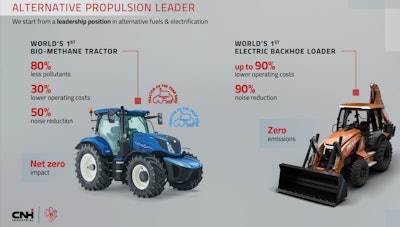 CNH Industrial
CNH Industrial
Since 2006, CNH has been exploring the limits of technology and the viability of market introduction of equipment using alternative fuel sources.
“We have a strong foundation and a clear path to sustain our leadership position in clean energy technologies,” Tur said. “To do this we continue to advance our tech roadmap. We are pursuing our strategic goals for electrification and alternate fuels through both organic and inorganic means.”
On the agriculture side, CNH introduced a 100 percent biomethane fueled tractor in 2021 and has showcased its power pack e-Source to connect implements.
“It not only brings net zero impact but significantly reduces pollutants while having a considerable impact on operating costs and cuts noise by half,” Tur said.
Conversely, a methane-powered wheel loader prototype, known as Project Tetra, was unveiled three years ago by Case Construction Equipment. In addition, the industry’s first electric backhoe was unveiled at Bauma in 2019.
“Benefits from electrification of construction equipment are clear,” she said. “It reduces operational cost, offers significant reductions in noise and emissions, which is critical to construction and opens up new business opportunities for indoor applications.”
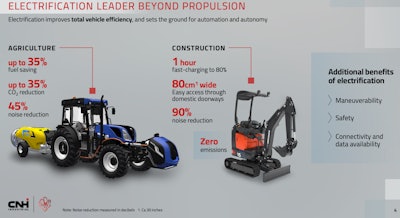 CNH Industrial
CNH Industrial
In both agriculture and construction, electrification involves far more than just propulsion. Tur noted that the challenge is overall vehicle efficiency.
For example, it involves simplification of power to attachments on agricultural or construction equipment. “Implements and attachments become more reactive compared to hydraulic versions with enhanced automation and sensory integration and data becoming fully available for applications such as predictive maintenance,” Tur said. “At CNH Industrial we are tackling these emergent trends by capitalization on our technology and innovation roadmap to become the leader in electrification and alternative fuels.”
Further, she said electrification enables new ways of working on a jobsite. “When the machine is not operating, it shuts down completely and makes zero noise,” Tur said. “This gives tremendous benefits to our construction workers as they are used to manually shutting down the machine and stop working to be able to communicate with their co-workers. Now they can continue working and communicate at the same time.”
With regard to full electrification, CNH will launch the first small electric tractor with leverage in its strategic partnership with Monarch. “We believe we are well positioned to deliver a range of electric farming products to satisfy our customers and improve their productivity, taking into account the technical constraints the industry has on battery energy density and battery cost in electrifying larger vehicles in the future,” Tur said.
Similarly, within the construction segment, she said the company plans to leverage the acquisition of Sampierana to accelerate its electric compact excavator range and overall expand electric construction equipment products. A preview of that expansion was on display during the Capital Market Day in the form of the CX15 EV mini excavator, slated to debut in 2023.
“We were able to get the benefits of zero emission and dramatically reduce noise by containing the size of the excavator so that it now fits through domestic doors, opening up new opportunities for construction workers in indoor applications,” Tur said.
Tur believes CNH Industrial has built a strong foundation for the electrification of the construction segment to deliver long-term success for its customers.
“CNH Industrial is at the beginning of its electrification and alternate fuels journey, but we are already well positioned for a net zero carbon future,” she said.
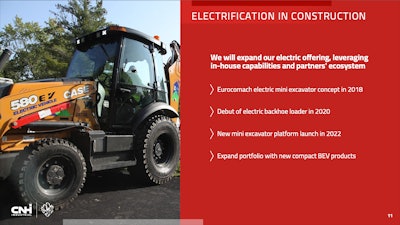 CNH Industrial
CNH Industrial


